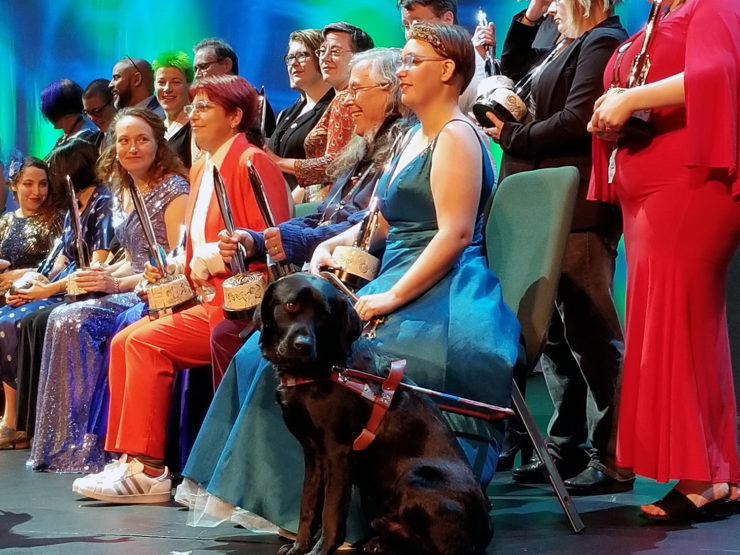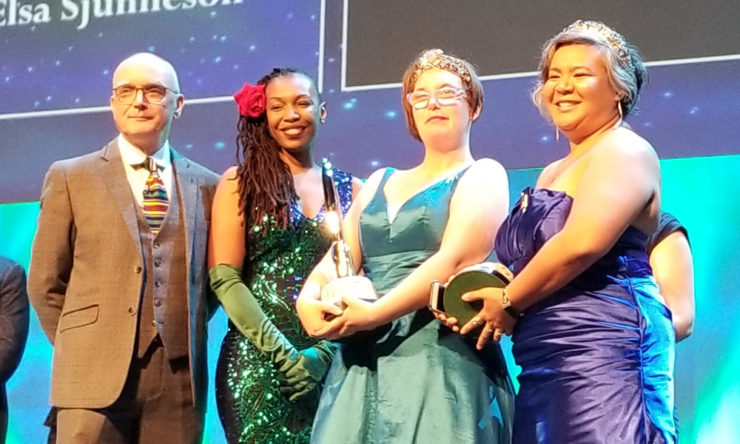There is an archetype of The Reader.
The vision of The Reader in childhood is of someone who cannot pull their nose out of a book. They stay up late, hiding underneath the covers after bedtime with a flashlight, reading late into the darkest nights.
The Reader, based on that image, is sighted. Capable of reading a book with a flashlight, able to sustain long reading sessions like that.
So when I became the first blind person to win a Hugo Award, it defied the image of The Reader. Of the Writer. Of the devout Teller and Consumer of Stories.
I reveled in the printed word as a child. But I fought tooth and nail to access it. My single eye skitters across a printed page. My nose drifted a few centimeters above the book, my eye focused on the printed word, close enough to read. I never hid underneath a sheet with a flashlight, but I would huddle next to my bedside lamp, sometimes burning my hair against a hot lightbulb to catch the rest of the words on a page.
It would have been easier to read in the dark if I’d been able to read braille.
The books I wanted to read didn’t come in large print. I never learned braille (and the selection there is even smaller) and because I’m also deaf, audiobooks have always been a bit of a challenge.
I share this not as a tale of adversity, but as a reminder that the literary world has a long way to go in sharing our words in accessible formats. It shouldn’t have been up to me as a reader to have to claw and scrabble at texts; it’s the responsibility of the larger world, of the publishing industry in particular, to create accessible formats that establish an equal footing.
In 2010 I started to be unable to read physical books. Maybe it was the consequence of graduate school enacting its revenge; maybe it was just aging a little bit.
What I know is, I found myself reading Game of Thrones, but while I used to be able to stand the eye strain, it wasn’t even worth it anymore. Words smeared across the page, my eyes creased at the edges, even more than they did before. The tiny print in the massive paperback began to escape me. It wasn’t viable. I couldn’t read. It wasn’t fair.
In fact, the last physical book I read for pleasure was A Dance With Dragons, which was published in 2011.
I don’t have to squint, to fight, to claw my way to the fiction that I love anymore. I don’t have to punish myself in order to stay current with my genre. Books are no longer solely in the hands of the sighted. No longer do I have to wonder if a book I want to read will ever make it to large print. There are assumptions made by publishers about who needs access to books in large print, most of them biased against my age and interests.
Technological advances are incredible. Many people only see these innovations in the light of what benefits an able-bodied person (i.e., the Kindle is small! It fits in your purse! You can take it anywhere!)
For me, a Kindle meant that I could access every book that I wanted to read (minus those that aren’t ebooks). The technology that allows me to access a book—or to edit a story, or to write one—is mired in abled technological needs.
Blind people are a vital part of our cultural memory, a part of the conversation of our genre. We help shape your literary world.
The Reader is no longer required to be sighted.
That means that The Writer, the Editor, doesn’t have to be, either.

As I said in my acceptance speech from the Hugo Awards, we have always been on this spaceship.
We just haven’t always been visible. It is difficult to quantify who is a first when it comes to disability because society has not always made it safe to identify publicly. Blindness and deafness, mental illness and mobility issues—they have been things to hide in the past. They have been the cause for institutionalization, they have been the cause of so many hurts and harms.
So we have hidden in the shadows.
But we don’t have to hide anymore—today it is easier to publicly identify, to share the struggles of being a part of this community, to share the difficulty of working in an industry that relies on the written word when your eyes can no longer access it on a printed page.
And while I am the first blind person to win a Hugo Award, I am far from the first blind person to be a finalist (though I may be the first blind woman).
I want to tell you about the person who was nominated ahead of me—someone who Jo Walton told me about at Worldcon this year. His name was James White. While he garnered a novel finalist spot in 1961 while sighted, he was also a finalist in the short story category for his 1996 story “Un-Birthday Boy” in Analog magazine, well after he had lost his sight due to diabetes. I haven’t been able to dig up a digital copy of his story so that I can read my predecessor’s work. But I want to.
I am not the first disabled person to win. There have been others. They may not have publicly identified as such; they may not have been able to. But they were there.
This community is full of disabled people. We have been here for ages and ages, fighting and clawing our way to being heard. I am not alone here, not by a mile. I am backed by a beautiful community which I hope will celebrate with me—because we belong.
Winning this Hugo is important, because it gives me hope that I won’t be the only blind person for long. With the advances in technology that allow me to write, to read, to edit, to tell the stories of my people and to reach the audiences that these words are intended for, perhaps it will help grow and inspire more genre lovers who cannot see, or hear.
For those of us who have been barred from literature due to the access vectors of our past, the future is all too bright and beautiful. Our words belong here, amongst the digital pages of the future, and amongst the dead tree pages which are still available to those who can access them, or to those who feel the words as bumps on a stiff page.
Winning the Hugo is important because it shows that blind people are welcome in this place, that we are capable, and that our work is not just good—it can be extraordinary.
This win, this first, confirms that our words, our narratives—they are precious. But most importantly: they are valued.
Elsa Sjunneson-Henry is a gimlet made from feminism and snark. She’s a deafblind speculative fiction author, and she writes disability focused nonfiction as well. Her work has appeared in Uncanny, Fireside, Tor.com, CNN, and The Boston Globe, and she was a 2019 Hugo Award finalist for Best Fan Writer, as well as winner of the Best Semiprozine Hugo for her work as a Guest Editor of Uncanny Magazine’s Disabled People Destroy Science Fiction Special Issue. She writes from a dragon lair in NJ, and can be found on the web @snarkbat and snarkbat.com










